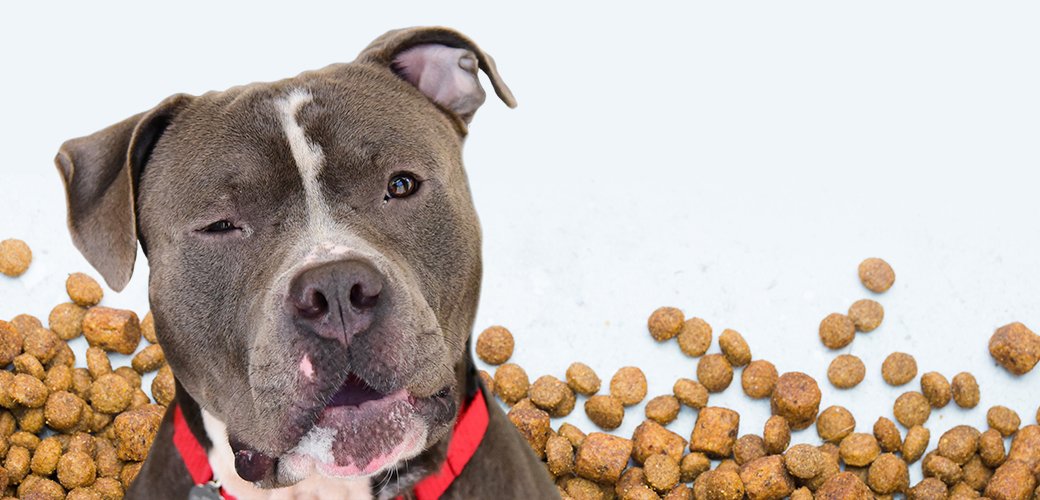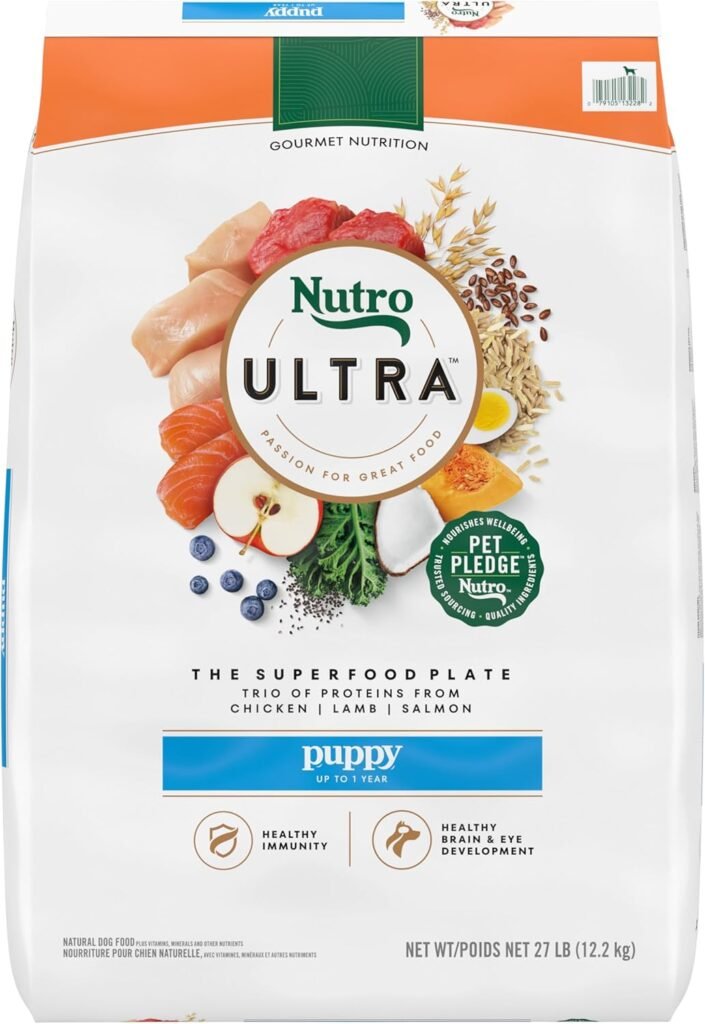Introduction
One of the most crucial choices you will make as a pet owner is selecting the best dog food for Pitbull puppies. A balanced diet is the cornerstone of long-term health, robust immunity, and healthy growth. Because of their active disposition and strong physique, Pitbull puppies have certain nutritional requirements that must be satisfied in order for them to grow and thrive.

Understanding Pit bull Puppy Nutritional Requirements
What Nutrients Are Essential for Pitbull Puppies?
To support their quick development and active lifestyle, pitbull puppies need food that is well-balanced and full of critical nutrients. Let’s examine each of the essential elements that their diet ought to have.
Protein: The Component That Builds Growth
Muscle growth requires protein, especially in a powerful breed like the Pitbull. Fish, poultry, and other high-quality animal-based proteins ought to constitute the main component of your puppy’s diet.
Healthy Fats for Energy and Skin Health
Pitbull puppies require healthy fats to fuel their high levels of activity. Flaxseed and fish oil, which are rich sources of omega-3 and omega-6 fatty acids, are also beneficial for healthy skin and a glossy coat.
Vitamins and Minerals for Immune Support
Calcium, phosphorus, and vitamin D are all critical nutrients for strong bones and teeth. Furthermore, antioxidants like vitamins E and C assist the immune system, allowing your dog to fight illnesses.

Why Choosing the Right Dog Food Matters
Impact of Nutrition on Growth and Development
The food you feed your Pitbull puppy can have a significant impact on their growth and development. A high-quality diet will guarantee that your puppy develops into a strong and healthy adult dog. In contrast, inadequate nutrition can result in a variety of health problems.
Common Pitbull Puppy Health Issues Related to Diet
Allergies and Sensitivities
Pit bulls are susceptible to food allergies and sensitivities, which can cause skin irritations, itching, and gastrointestinal problems. Identifying and avoiding trigger elements in dog food is critical for keeping your puppy healthy.
Obesity and Joint Problems
Pit bulls are muscular dogs, but if not properly nourished, they can quickly gain weight. Obesity in pups can cause joint difficulties and other health issues. It is critical to select a food that supports lean muscle development while limiting calories.

Top 5 Picks for the Best Dog Food for Pitbull Puppies
#1: Blue Buffalo Wilderness Puppy Food
Key Ingredients and Benefits
Blue Buffalo Wilderness Puppy Food is one of the best dog food for Pitbull puppies, with a high-protein, grain-free recipe that helps your Pitbull puppy thrive. The first component is deboned chicken, which is supplemented with healthy fruits and vegetables to make a complete meal.
Why is it a top choice?
This formula includes DHA and ARA, important fatty acids found in mother’s milk that promote brain growth and retinal health. It’s also free of artificial preservatives, making it a healthier option for your puppy.
#2: Wellness CORE Grain-Free Puppy Formula
Key ingredients and benefits
Wellness CORE is another grain-free, high-protein choice. It contains deboned chicken, turkey meal, and salmon oil to ensure a well-balanced diet. This mix is also enriched with antioxidants, probiotics, and omega fatty acids.
Why is it a top choice?
Wellness CORE, with its concentration on high-quality animal proteins and inclusion of probiotics, is a fantastic choice for supporting digestive health and promoting an immune system that is strong.
#3: Taste of the Wild High Prairie Puppy Formula
Key ingredients and benefits
Taste of the Wild is a unique mix that uses buffalo and roasted venison as essential protein sources. This grain-free diet is rich in fruits and vegetables, which provide natural antioxidants that promote general health.
Why is it a top choice?
This meal is highly digestible and contains a range of probiotics that improve intestinal health, making it one of the best dog food for Pitbull puppies with sensitive stomachs or allergies.
#4: Merrick Grain-Free Puppy Recipe
Key ingredients and benefits
Merrick’s Grain-Free Puppy Recipe, which is widely recognized as one of the best dog food for Pitbull puppies, has deboned chicken and sweet potatoes as its major components, providing a good mix of protein and complex carbohydrates. Furthermore, this diet includes glucosamine and chondroitin, which promote joint health.
Why is it a top choice?
Merrick’s formula is made in small batches to ensure both quality and freshness. The addition of glucosamine and chondroitin makes it especially healthy for Pitbull puppies, helping to avoid joint problems as they mature.
5:Nutro Ultra Puppy Food
Key ingredients and benefits
Nutro Ultra Puppy Food is regarded as one of the best dog food for Pitbull puppies because of its “superfood” combination, which contains high-quality proteins like chicken, lamb, and salmon, as well as a range of fruits and vegetables. This formula also contains DHA, which promotes brain development.
Why is it a top choice?
Nutro Ultra’s emphasis on natural ingredients, combined with its unique blend of high-quality proteins, make it an excellent choice for Pitbull puppies. The extra DHA ensures that your puppy’s cognitive processes grow normally.
How to Transition Your Pitbull Puppy to a New Dog Food
Importance of Gradual Transition
Switching your puppy’s diet abruptly can cause stomach issues. A gradual transition allows your puppy’s digestive system to adjust to the new diet, lowering the chances of diarrhea or vomiting.
Step-by-Step Transition Guide.
Begin by including a little bit of the new food, such as the best dog food for Pitbull puppies, into your puppy’s current diet, gradually increasing the proportion over the course of a week. By the end of the transition time, your puppy should be consuming just the new food.
Tips for Feeding Pitbull Puppies
How frequently should you feed your Pitbull puppy?
Pitbull puppies should be fed three to four small meals per day until they reach about six months old. After six months, you can limit feeding to two meals each day.
Monitoring Growth and Portion Size
Portion sizes should be adjusted based on your puppy’s age, weight, and activity level. Monitoring your puppy’s growth is critical; consult with your veterinarian on a frequent basis to ensure they are gaining weight at a healthy rate.
Recognizing signs of food intolerance or allergies
If you observe symptoms like chronic itching, skin rashes, ear infections, vomiting, or diarrhea, your Pitbull puppy may have a food intolerance or allergy. Identifying the precise substance producing the response is critical. In some circumstances, switching to hypoallergenic or limited-ingredient dog food might help reduce these symptoms. Always consult your veterinarian before making any modifications to your puppy’s food to confirm that it is the proper decision.
Conclusion
Choosing the finest dog food for Pitbull pups is critical to their healthy development and general well-being. By feeding your puppy a high-quality, balanced meal that fulfills their specific nutritional requirements, you are preparing them for a strong and healthy future. Whether you choose one of the top five options or another high-quality brand, make sure the meal is abundant in protein, healthy fats, vitamins, and minerals.
What is the best dog food for Pitbull puppies with allergies?

For Pitbull pups with allergies, search for dog food that is hypoallergenic or has a restricted ingredient list. Brands like Wellness Simple and Blue Buffalo Basics are well-known for their allergy-friendly formulations. These diets frequently eliminate common allergies like wheat, dairy, and certain proteins, making them a better option for sensitive dogs.
How much should I feed my Pitbull puppy daily?

The quantity of food you should give your Pitbull puppy depends on their age, weight, and activity level. Young puppies (less than six months old) should be fed three to four tiny meals each day. As they become older, you can limit the number of meals to two each day. Always follow the feeding directions on your dog food packaging and speak with your veterinarian to ensure your puppy is getting enough food.








I am really happy to glance at this blog posts which includes tons of helpful data, thanks for providing these kinds of
information.
Thanks for sharing your info. I truly appreciate your efforts and
I will be waiting for your further write ups thanks once again.
Aw, this was an exceptionally nice post. Taking the time and actual effort to create a good article…
but what can I say… I procrastinate a lot and don’t seem to get anything done.
Howdy! I realize this is somewhat off-topic however I had to ask.
Does operating a well-established website like yours take a massive amount
work? I am completely new to running a blog however I do write in my
diary every day. I’d like to start a blog so I will be able to
share my personal experience and thoughts online. Please let me know if you have
any suggestions or tips for brand new aspiring bloggers.
Appreciate it!
Hurrah! In the end I got a webpage from where I know how to truly get useful data regarding my study
and knowledge.
Sweet blog! I found it while surfing around on Yahoo News.
Do you have any suggestions on how to get listed in Yahoo News?
I’ve been trying for a while but I never seem to get there!
Many thanks
I’m not sure where you are getting your information,
but good topic. I must spend some time studying much more or understanding more.
Thank you for excellent info I used to be on the lookout for this
info for my mission.